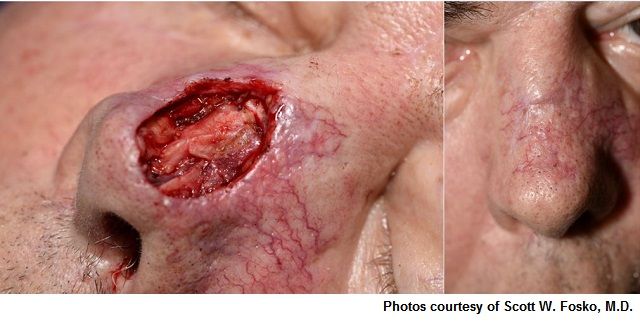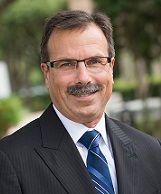- Case-Based Roundtable
- General Dermatology
- Eczema
- Chronic Hand Eczema
- Alopecia
- Aesthetics
- Vitiligo
- COVID-19
- Actinic Keratosis
- Precision Medicine and Biologics
- Rare Disease
- Wound Care
- Rosacea
- Psoriasis
- Psoriatic Arthritis
- Atopic Dermatitis
- Melasma
- NP and PA
- Skin Cancer
- Hidradenitis Suppurativa
- Drug Watch
- Pigmentary Disorders
- Acne
- Pediatric Dermatology
- Practice Management
- Prurigo Nodularis
- Buy-and-Bill
Article
Multidisciplinary care improves patient outcomes
Author(s):
Multidisciplinary skin cancer care is an approach that might not only improve patient outcomes, but also professional satisfaction, researchers reported at AAD 2018 this week in San Diego.

Image one on the left: A preoperative acantholytic and moderately differentiated squamous cell carcinoma of the nasal dorsum in an immunocompromised renal transplant patient. Image two on the right: Surgical defect after Mohs surgery where perineural invasion was detected. The patient will be reconstructed by plastic surgery and receive postoperative radiation therapy. (Photos courtesy of Scott W. Fosko, M.D.)
There are conditions that dermatologists and other specialists encounter in practice that are straightforward and don’t need input from other specialties. But for the more complex and potentially life-altering or life-threatening conditions, such as some forms of skin cancer, a multidisciplinary approach through collaboration, can drive better patient outcomes and fulfill professional relationships, says Scott W. Fosko, M.D., who directed the session on developing effective multidisciplinary skin cancer care at the meeting.

Dr. Fosko
Dermatologists are well positioned to lead multidisciplinary skin cancer teams because of their deep and broad understanding of skin cancer, said Dr. Fosko, a dermatologist with Mayo Clinic Florida.
“When we see the patient, we’re wondering what [the lesion] looks like under the microscope. We have that unique perspective of putting together [clinical and pathology presentations]; then, seeing how different types of cancer respond to treatment approaches,” he says. “Dermatologists should be comfortable to recognize that and engage their colleagues, engage their hospital tumor boards and provide a leadership role in the care of these patients.”
A goal of multidisciplinary care is to connect with different specialists and collaborate across disciplines to provide more input and different viewpoints when determining a patient’s care.
“What I have learned over many years of doing this is the collaboration really drives a better understanding of each of our areas of expertise. It helps us understand what each specialty can bring to patient care. And it helps us to understand limitations in our specialties,” Dr. Fosko says. “We become very open to new approaches and new ideas.”
In cases where dermatologists might throw up their hands because they’re not sure what to do for skin cancer care, collaboration can provide comfort and confidence, he said.
The approach is not only for dermatologists who are part of academia or a large health system. Community-based dermatologists also can develop these collaborative care models for skin cancer and other diseases.
“Really, what it takes is just a group of individuals-whether it’s an academic or a community-based practice-who, on the clinical side, have a common interest in skin cancer,” Dr. Fosko said.
Team members in a multidisciplinary skin cancer collaboration would include specialists that diagnose, treat, and manage skin cancer patients. Among those clinicians: a dermatologist, Mohs surgeon, plastic surgeon, surgical oncologist, medical oncologist, radiation therapist surgical, and dermatopathologist.
Different skin cancer types and cases might require different team members.
“That’s where you may have somebody who has an interest in melanoma but doesn’t really have an interest or awareness of advanced basal cell carcinoma. For the advanced basal cell case, you have to expand your team,” he said.
Many physicians think that simply sharing patients is multidisciplinary care.
“That can help, but I believe that getting all these physicians in the same room and starting a tumor board, for example, really helps open the discussion and brings to light the range of presentations that patient can have. That’s when new ideas, innovation, and advancement of care can flourish,” Dr. Fosko said.
Dermatologists in the community in private or group practices can start by reaching out to specialists and forming collaborations. Establishing the multidisciplinary collaborative is only the beginning.
“When you establish more expertise, your referral pattern grows significantly. And all of the sudden the clinical material is so rich that now you have the foundation to do clinical trials. Another example [of how the collaboration can grow] is I do a lot of surgery. We now-out of the multidisciplinary skin cancer program-have a multidisciplinary reconstruction course, where plastic surgeons, head and neck surgeons, dermatologists, Mohs surgeons, and oculoplastic surgeons collaborate and teach others how to do surgery of the head and neck,” he said.
Studies have shown that multidisciplinary care improves patient outcomes, but Dr. Fosko says the approach has also given him great satisfaction as a physician.
“For me, it’s the most exciting way to practice medicine, because you have colleagues and partners who are on that same journey with you to improve patient care. It also assists with developing new innovative therapies and advances which bring research to the bedside. It is a privilege to take care of patients, and when you come to work and you have a team that you’re part of, it is so much more satisfying and rewarding,” he says.
Dermatologists and other clinicians might be hesitant to collaborate on skin cancer care for fear that they’ll lose control or patients. They might think that what they’re doing alone for these patients is working just fine.
Sometimes there’s fear of the unknown. Dermatologists may become uncomfortable because they don’t fully understand what their colleagues are doing,” he says.
What can start as trepidation often transitions to a respectful and spirited sharing of knowledge, which, in the end, improves patient care.
“I see this in my practice all the time: We often get referrals when things don’t work well. And there are more complications from these cancers, as a result,” he says. “I believe that our ability to cure a cancer is in its early presentation. So, rather than do your best and hope that good things happen, only to find out things didn’t work and it’s time to send the patient to a multidisciplinary skin cancer group, why not establish a team, so you make the best decisions early on. I think that’s the paradigm that we need to move to, to care for our skin cancer patients.”
DISCLOSURES
Dr. Fosko is an advisor to EMD Serono and Sun Pharmaceutical Industries, and an investigator with Genentech
REFERENCES
“U015 - Developing Effective Multidisciplinary Skin Cancer Care: Driving Better Patient Outcomes and Fulfilling Professional Relationships,” American Academy of Dermatology 2018 annual meeting. Bowman, Paul H., MD; Fosko, Scott W., MD; Sluzevich, Jason C., MD. 4:30 p.m., Friday, Feb. 16.





